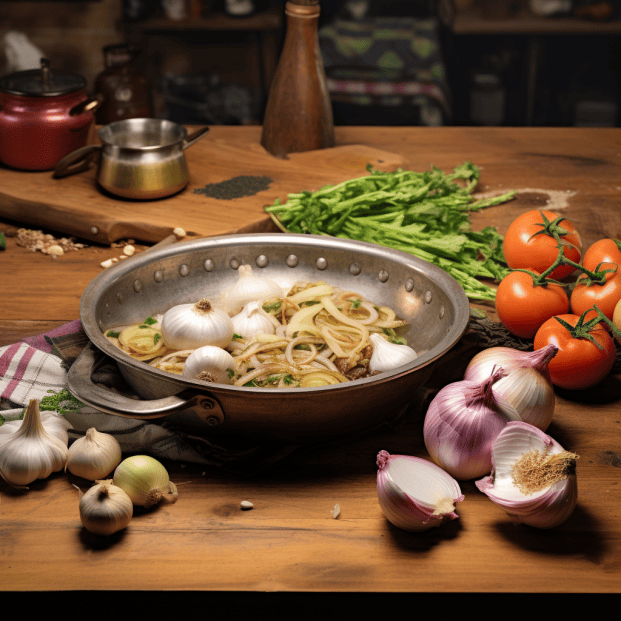Why can’t some vegetarians eat garlic and onions? As a veggie who loves these flavors, I was shocked to learn not all plant-based eaters include them.
What gives? Turns out there are fascinating reasons tied to beliefs that shape this dietary choice.
Join me as we explore the intersection of flavor and faith, uncovering religious, health and philosophical motives for going veggie without alliums.
Get the inside scoop on thriving without these savory staples.
Want to hear a joke about onions? Never mind, it’ll just bring tears to your eyes! Okay, no more bad jokes.
Let’s get growing on the surprising world of vegetarianism sans garlic and onions.
As a vegetarian for over a decade, I’ll draw on research and personal experience to provide unique insights.
Discover little-known facts about how beliefs can transform mealtimes.
This intel is crucial whether you’re curious, transitioning to meatless meals, or a seasoned herbanivore.
Together we’ll dig into the fascinating reasons some choose to forgo flavor in favor of tradition or wellness.
Gain a deeper understanding of how values shape this plant-based approach.
Get ready to broaden your knowledge of the many shades of vegetarianism.
Let’s uncover the truth about going veggie without garlic and onion!
KEY TAKEAWAY
Why can’t vegetarians eat garlic and onion?
Vegetarians avoid garlic and onions (1) in their diets due to religious and cultural beliefs, as these ingredients are considered pungent and potentially stimulating, conflicting with their dietary principles.
When Vegetables Aren’t Enough: Religions that Forbid Garlic and Onions
For some faiths, veggies alone don’t cut it – garlic and onions are forbidden too.
While these flavor boosters are kitchen staples, certain religions prohibit them for symbolic reasons.
The origins trace back to ancient Hindu, Jain and Buddhist traditions.
For them, food isn’t just sustenance – it’s deeply spiritual.
Garlic and onions are believed to stir up passion, aggression and restlessness.
By avoiding them, followers maintain purity and balance.
Hindus who follow a satvik diet dodge garlic and onions to stay mentally clear.
These “dulling” foods are thought to cloud the mind.
Similarly, Jains skip them to uphold ahimsa and avoid harming organisms during harvesting.
While the logic varies, respecting these faith-based food customs is important for understanding diverse cultural beliefs.
Appreciating the spiritual significance of dietary do’s and don’ts fosters inclusion.
The Surprising Health Reasons Behind Avoiding Garlic and Onions

The health motives for avoiding garlic and onions (2) may also raise eyebrows.
While delicious, these flavor dynamos can cause issues for some vegetarians.
First, they contain fructans – carbs that cause bloating, gas and tummy troubles for those with sensitive digestion.
Skipping garlic and onions helps sidestep discomfort.
Additionally, in Ayurvedic diets, they are considered “rajasic” foods that stimulate and energize.
Followers believe they increase aggression and disrupt inner peace and clarity.
While surprising for some, the health and spiritual rationales shape this meat and allium-free path for many vegetarians.
Appreciating personal perspectives on food is an important part of fostering diet diversity and tolerance.
Getting Creative with Flavor: Cooking Without Garlic and Onions

Whipping up full-flavored vegetarian cuisine without garlic or onions is absolutely possible with the right substitutions.
While these aromatic ingredients often form the flavor base of dishes across cuisines, there are plenty of ways to adapt recipes for a satisfying, allium-free mealtime.
To replace the savory, pungent notes of garlic, turn to fresh herbs like basil, thyme and oregano.
Their earthy flavor profile mimics garlic beautifully.
You can add them generously to pastas, soups, stews, dressings, and more.
Likewise, spices like cumin, paprika and curry powder pack warmth and complexity perfect for garlic-free cooking.
For onion, focus on cooked alliums like leeks, scallions or shallots which offer sweetness and texture with a milder punch.
Incorporate them into soups, sautés, baked goods and grain bowls.
Veggies like mushrooms and carrots also supply underlying sweetness.
Play with different combinations to discover new staple pairings.
While it takes creativity and experimentation at first, cooking without garlic or onions can become second nature.
With the right herbs, spices and aromatics, you can build deep flavor layers into any dish.
Discover your go-to combinations for satisfying, harmonious meals.
Ancient Food Philosophies That Shun Garlic and Onions
Beyond just taste preferences, ancient vegetarian philosophies like Ayurveda and Buddhism have traditionally discouraged garlic and onion use for centuries.
Their bold flavors are believed to overstimulate the senses and disturb inner balance and peace.
In the Ayurvedic diet, garlic and onions are classified as “rajasic” – foods that increase passionate desires, aggression, and attachment to worldly pleasures.
Consuming them is thought to make it more challenging to maintain equanimity of mind and spirit.
Likewise, Buddhist vegetarian cuisine avoids these ingredients since their intense flavors contradict the principle of non-violence towards all living beings.
Even the act of harvesting garlic and onions uproots organisms in the soil, going against ideals of compassion.
By avoiding garlic, onions and otherstimulants, adherents aim to maintain a peaceful mind-body balance and detachment from cravings.
Instead, they flavor food with milder aromatics like ginger, lemongrass, asafetida and chives.
While these ancient philosophies may seem restrictive to some modern palates, they provide fascinating perspectives on how food interacts with our minds, bodies and spirits in intricate ways.
Appreciating this wisdom helps broaden our comprehension of diverse cultural beliefs surrounding diet and wellbeing.
Adapting Ayurvedic and Buddhist Diets: Vegetarianism Without Garlic and Onions
Transitioning to Ayurvedic or Buddhist eating as a vegetarian can be tricky without garlic and onions – but it’s doable!
These flavor bombs are staples across cuisines, but Ayurveda and Buddhism encourage avoiding them for purity.
Both philosophies emphasize balance and calmness from food.
Garlic and onions are believed to stimulate aggression and passion – the opposite of the tranquility needed for meditation.
In Ayurveda, they’re considered “rajasic” foods that energize and promote cravings, disrupting equanimity.
Buddhists skip them since the bold flavors increase desire and attachment.
But vegetarians hankering for that onion-garlic flavor have options:
Hing or asafetida adds a savory umami taste without the pungency.
Herbs like cumin or fennel seeds also incorporate depth and warmth.
With experimentation, you can re-create favorite dishes to align with these ancient food traditions.
Craving Garlic and Onion Flavor: Substitutions for Restricted Vegetarians
If you’re a restricted vegetarian who craves the taste of garlic and onion, there are alternative ingredients that can provide similar savory notes without compromising your dietary principles.
Garlic and onion are commonly used in cooking to enhance flavor, but some vegetarians choose to avoid them due to certain beliefs or dietary restrictions.
However, there are several substitutions available that can help satisfy your cravings.
One option is to use garlic and onion powders instead of the fresh versions.
These powders are made by dehydrating the vegetables and grinding them into a fine powder.
They retain much of their flavor and can be easily incorporated into dishes like soups, stews, or sauces.
Another substitution is using herbs and spices with strong flavors to mimic the taste of garlic and onion.
For example, cumin has a warm and earthy flavor that can add depth to dishes, while paprika offers a slightly smoky taste.
Other options include ginger for its zingy kick or leeks for their mild onion-like flavor.
Additionally, you can experiment with ingredients like shallots or chives which have milder flavors compared to garlic and onions but still provide some aromatic qualities.
Redefining Vegetarian: Inclusivity for Those Who Avoid Garlic and Onions
While some vegetarians choose to avoid garlic and onions, there is a need for redefining the concept of vegetarianism to be more inclusive.
Many people adhere to a vegetarian diet for various reasons such as ethical concerns, health benefits, or environmental sustainability.
However, dietary restrictions can vary widely among individuals who identify as vegetarians.
Here are four key reasons why we should embrace inclusivity in vegetarian food choices:
- Cultural diversity: Garlic and onion are staple ingredients in many cuisines around the world. By excluding these flavors from the definition of vegetarianism, we inadvertently limit the culinary experiences of individuals from diverse cultural backgrounds.
- Health considerations: Garlic and onion offer numerous health benefits, including anti-inflammatory properties and cardiovascular support. Restricting their consumption may deprive some vegetarians of important nutrients.
- Personal preferences: Just like any dietary choice, being a vegetarian should be flexible enough to accommodate personal preferences and taste preferences.
- Avoiding judgment: Excluding garlic and onion from vegetarian diets can lead to judgment or exclusion within the community itself. Inclusivity promotes acceptance and understanding among all vegetarians.
Conclusion
In conclusion, there are valid reasons why certain religions and ancient food philosophies forbid the consumption of garlic and onions.
These restrictions have shaped the diets and cooking techniques of many individuals.
From health concerns to spiritual beliefs, the avoidance of garlic and onions is deeply rooted in various cultures.
However, it is possible to create flavorful vegetarian dishes without using garlic and onions.
With creativity and the use of substitutes, one can still enjoy delicious meals that meet their dietary restrictions.
It is important to embrace inclusivity in our definition of vegetarianism and accommodate those who choose to avoid these ingredients.
In doing so, we can foster a more inclusive and understanding environment for individuals with different dietary preferences.
By respecting and honoring these restrictions, we can promote a sense of unity and acceptance among diverse communities.
References
- https://www.chinavegans.org/news/ask-mang-why-do-many-chinese-vegans-and-vegetarians-also-abstain-from-garlic-and-onions
- https://www.healthline.com/nutrition/disadvantages-of-onion
Related Articles
- https://bowlakechinese.com/garlic/
- https://bowlakechinese.com/what-chinese-dish-doesnt-have-garlic/
- https://bowlakechinese.com/why-chinese-eat-garlic/
Was this helpful?

I am a skilled chef assistant with a passion for Asian cuisine, I have honed my craft through formal training at At-Sunrice GlobalChef Academy and years of experience in the culinary industry. I have extensive knowledge of cooking techniques and herbs and spices, with a particular focus on traditional Chinese dishes. I’m also an author of the book “Delicious Keto Low Carb Chinese Food for Busy Moms and Fitness Enthusiasts” which is sold on Amazon. On my blog, bowlakechinese.com, I share my expertise in Asian cuisine and provide tips and recipes for those interested in low carb Chinese cuisine.

